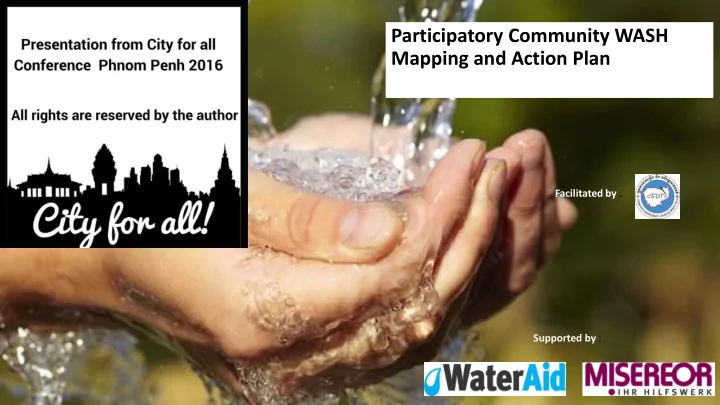

Participatory Community WASH Mapping and Action Plan Facilitated by : Supported by :
Informal Settlement (Temporary settlement) : have been illegally built in the capital city, municipal and urban areas which considered as public state land (Circular03, Royal Government of Cambodia, May 2010). Circular03 : is intended to provide resolution for only temporary settlements on state land which has been illegally occupied. Human rights and Informal settlements : rights to access to public services (basic needs).
Challenges of Informal settlements - Tenure insecurity - slum dwellers lack formal supply of basic infrastructure and services (Poor environment/ lack of clean water /no waste water management, no public drainage system ) - public space and green areas, and are constantly exposed to eviction, disease and violence (HABITAT III Issue Papers, Informal Settlements, Oct 2016) - Lack of engagement and relationship between local communities and local authorities.
Komru Thmey Community (2013) Challenges ៖ - Lack of Hygiene, drinking water, no electricity, no waste management
Our ur obj objectiv ives: To To empower communit ity members by by provid idin ing technical assistance, partic icularly ly within in WASH, and to to assist communit itie ies in in develo loping Communit ity Actio ion Plans (CAP) that can be be in integrated wit ith the government Commune In Investment Plan ans (C (CIP IP). Local communities and authorities in Siem Reap have improved knowledge and skills in WASH, mapping, surveying and documenting land occupancy - capacity of CEDT staff is improved in WASH expertise.
• Collaboration between communities and local authorities • Share practical experiences dealing with the informal settlements in other places • Build trust and relationship between communities and authorities • Technical and legal support and Community Mapping and Documentation including informal settlement mapping, land documentation, WASH documentation, legal analysis of land etc.) • Community networking
Results • Local authorities response to community needs from WASH survey (water and electricity connection, pipeline, waste management, dirt road construction) • Joint control rapid of informal settlements • Behavioral Change from community members • Identify housing solutions and city planning to engage community voice.
Before After
Considering • Political willingness from national authorities: provide legal framework to support informal settlement but no financial support for implementation. • Government responses to access to drinking water, sanitation, and waste water management • Communities’ roles are in response to identify housing solutions and infrastructure design which collaborate with local authorities. • Stakeholders engagement: civil society, local and international NGOs(urban), policy makers, academic, professionals, private sectors etc
Thanks You !
Recommend
More recommend